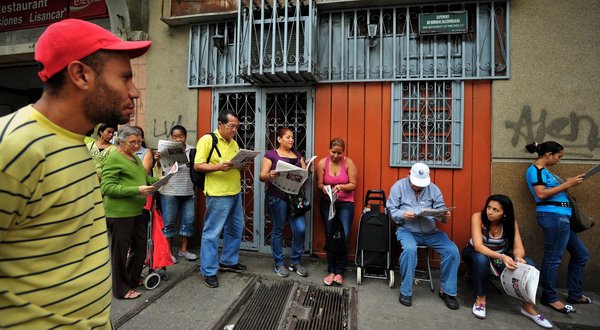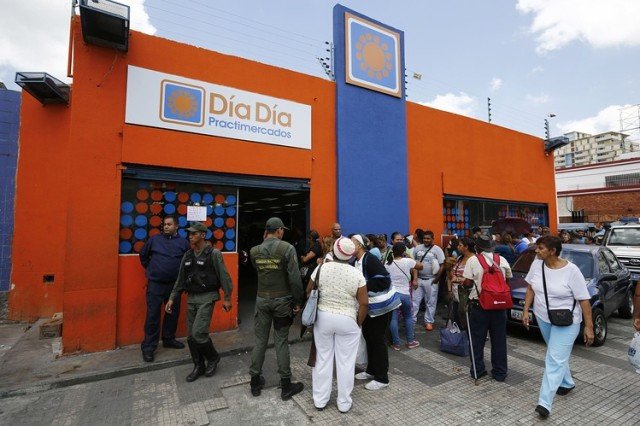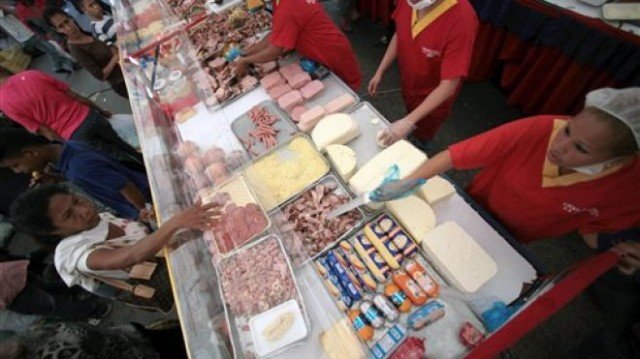In a move to reduce food hoarding and panic buying, Venezuela will install about 20,000 fingerprint scanners at grocery stores across the country.
Over the last year there have been long queues at supermarkets because of widespread shortages of basic goods.
President Nicolas Maduro said the shortages were due to manipulation of the food supply and prices.
Last month the owners of several chains of supermarkets and drugstores were arrested for allegedly artificially creating long queues by not opening enough tills.
Nicolas Maduro has also accused Colombian food smugglers of buying up price-controlled goods in state-run supermarkets along the border.
Last week South American foreign ministers said the region would help Venezuela address the shortages.
The lack of staple foods and medicines in Venezuela has contributed to discontent and to frequent large, often violent anti-government demonstrations.
The economic crisis has been made worse by falling oil prices.
Venezuela’s plummeting currency rates and the falling price of oil by nearly half since November has diminished its supply of dollars to buy imported food.
Venezuela’s President Nicolas Maduro has ordered the takeover of private supermarket chain Dia Dia by the state food agency.
During a TV address, Nicolas Maduro accused Dia Dia of hoarding food during huge shortages in the country.
This week, soldiers and government workers were sent to branches of Dia Dia supermarket and Farmatodo pharmacy chain to supervise sales.
Venezuela has been in economic crisis after the drop in oil prices.
Analysts say currency controls that restrict the availability of dollars for imports have played a key role in creating the scarcity of many items.
Directors and executives from both Dia Dia and pharmacy chain Farmatodo were arrested on charges of destabilizing the economy.
President Nicolas Maduro did not say that the takeover of the Dia a Dia chain would be permanent.
He said the chain “was waging war against the population” and the national food distribution agency would take over its running.
Nicolas Maduro has said many businessmen are conducting an “economic war”, colluding with the political opposition to oust his government.
[youtube tqP-s0Kn8p0 650]
A mandatory fingerprinting system will placed in Venezuela’s supermarkets to combat food shortages and smuggling, President Nicolas Maduro has announced.
Nicolas Maduro said the system would stop people from buying too much of a single item.
However, the opposition in Venezuela rejected the plan, saying the policy treated all Venezuelans as thieves.
Critics said fingerprinting consumers of staple products was tantamount to rationing and constituted a breach of privacy.
Up to 40% of the goods which Venezuela subsidizes for its domestic market are smuggled to Colombia, where they are sold at much higher prices, the authorities say.

A mandatory fingerprinting system will placed in Venezuela’s supermarkets to combat food shortages and smuggling
“The amount of staples smuggled to Colombia would be enough to load the shelves of our supermarkets,” Gen. Efrain Velasco Lugo, a military spokesman, told El Universal newspaper earlier this week.
The opposition blames what it says are the failed left-wing policies of the past 15 years – initiated by late President Hugo Chavez – for the country’s economic crisis.
Dissatisfaction with the shortage of many staples, as well as rampant crime and high inflation, led thousands of people in the western Venezuelan states of Tachira and Merida to take to the streets in January.
The protests quickly spread to the rest of Venezuela, which faces similar problems.
Earlier this month Venezuela launched an anti-smuggling operation on its border with Colombia.
It deployed 17,000 troops along the border and began closing all the crossings at night.
The one-month ban will be lifted in mid-September.
The decision to close the border was agreed with Colombia, where the smuggling of cheap goods from Venezuela is also seen as a major problem.
The Colombian government says it leads to a big loss in taxes, with complaints of unfair competition faced by local businesses.
According to the UN, 1 million Syrians are going hungry and helpless due to the 22-month civil conflict in the country.
The World Food Program (WFP) says it is helping 1.5 million Syrians, but continued fighting and an inability to use the port of Tartus to deliver food mean many people are not receiving aid.
The UN estimates that more than 60,000 people have been killed in the uprising, which began in March 2011.
Rebels have gained control of swathes of northern Syria in recent months.
The increasingly dangerous situation meant the WFP had pulled its staff out of its offices in Homs, Aleppo, Tartus and Qamisly, said agency spokeswoman Elisabeth Byrs.

According to the UN, 1 million Syrians are going hungry and helpless due to the 22-month civil conflict in the country
Late 2012 saw a sharp rise in the number of attacks on WFP aid trucks, said the agency, which has also been hit by fuel shortages.
Meanwhile, the UN refugee agency said the number of refugees fleeing the violence in Syria had leapt by nearly 100,000 in the past month.
It said there were 597,240 registered refugees and individuals awaiting registration as of January 6 – up from 509,559 the month before.
The UN estimates that around four million Syrians are in need of humanitarian aid.
Opposition forces have been making considerable gains in recent weeks, but their efforts to take control of areas around major cities including Damascus have met with stiff resistance and increasingly destructive air strikes.
On Monday, the New York Times reported that Israeli intelligence indicated Syrian troops were mixing chemicals – suspected to be the deadly nerve gas sarin – at two storage sites, and filling dozens of 500-pound (225 kg) bombs that could be loaded on airplanes.
The reports in late November prompted a flurry of international statements warning the regime of President Bashar al-Assad against using chemical weapons on his own people.




